Ciência_Iscte
Publications
Publication Detailed Description
Go global or go home: comparing the regional vs. global engagement of Brazil and South Africa at the UN General Assembly
Journal Title
Politikon
Year (definitive publication)
2020
Language
English
Country
United Kingdom
More Information
Web of Science®
Scopus
Google Scholar
This publication is not indexed in Overton
Abstract
Brazil and South Africa have long been regarded as archetypical regional powers, commanding more resources than their neighbours, spearheading regional projects and pursuing high-profile global status. Yet, recent years have also evidenced how the engagement with their regions and acceptance as leading players is often ambiguous and incomplete. How does one ascertain that a regional power privileges either the regional or the global stage? Through an original dataset of Brazilian and South African output at the UN General Assembly between 1994 and 2013, we monitor sponsorship patterns and thematic preferences in order to verify whether these countries indulged their regional partners and topics. Our findings suggest that Brazil and South Africa favoured their immediate neighbourhoods but have gradually engaged their regions in different ways: while Brazilian emphasis on regional peers and themes declined over the years, South Africa developed an increasingly more regionalised UNGA agenda.
Acknowledgements
--
Keywords
Brazil,South Africa,UN General Assembly,Regional powers
Fields of Science and Technology Classification
- Political Science - Social Sciences
Funding Records
| Funding Reference | Funding Entity |
|---|---|
| SFRH/BPD/116700/2016 | Fundação para a Ciência e a Tecnologia |
| 88881.132436/2016-01 | CAPES |
Contributions to the Sustainable Development Goals of the United Nations
With the objective to increase the research activity directed towards the achievement of the United Nations 2030 Sustainable Development Goals, the possibility of associating scientific publications with the Sustainable Development Goals is now available in Ciência_Iscte. These are the Sustainable Development Goals identified by the author(s) for this publication. For more detailed information on the Sustainable Development Goals, click here.

 Português
Português



